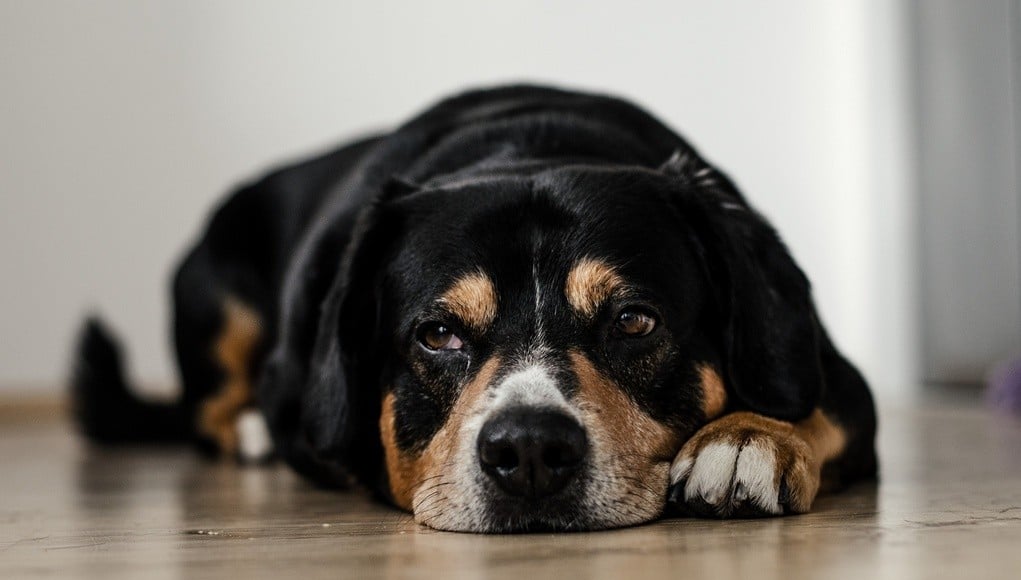Dogs mourn losses just like we do, and losing a member of their family can be devastating. Whether it is a canine companion or their human owner, a loss of that caliber can have negative effects on a dog both mentally and physically. No two dogs respond to a loss in the same way, so it's impossible to tell how he will react, but there are many things you can do help a dog adjust when the owner passes away.
Dogs in mourning can show many symptoms, including:
- loss of appetite
- lower water intake
- lethargy
- howling or whining for no reason
- hair loss
…and more. These symptoms can also increase in the weeks and months following the death. If your dog is exhibiting these signs, it is best to have them checked by your veterinarian just to be sure there is no other underlying health condition.
Many times when an owner passes away someone in the family or a close friend will step up to adopt the dog. That's exactly what happened to me.
Helping A Dog Adjust When The Owner Passes Away
I didn’t adopt my Shih Tzu Heidi from a shelter. I didn’t buy her after seeing her cute little face in a pet shop window, nor did I rescue her from a puppy mill. No, I inherited Heidi from my great-grandmother.
The passing of my great-grandma was heartbreaking, and it turned Heidi’s world upside-down. Not only had Heidi lost her owner, the person she devoted her life to, but she also had to leave her home and everything she knew to come stay with me and my family in a town an hour away.
 RELATED: Tips on How to Help a Stray Dog
RELATED: Tips on How to Help a Stray Dog
A change that big is hard on a dog of any age, not to mention a young puppy – which is what Heidi was at the time. We knew it was going to take some time for her to adjust to her new life. Instead of one owner, she now had four. Instead of spending time with great-grandma all day, she had to get used to us not being home all the time. Instead of being the only animal in the house, she had to share her new humans with a cat.
It was a lot for her to take in, so we did whatever we could to help her transition go as smoothly as possible. We made her feel welcomed and loved, and we were on high alert for any signs of grief or distress.
Instead of waiting for these signs to appear and not know how to deal with them, I decided to do a little research before we even brought Heidi into our home. I learned some really great tips and tricks for helping a dog adjust when their owner passes away and what to do if your new family member begins to show signs of mourning.
Refusing To Drink Water
This is a big sign to look for. Dogs can become so depressed over the loss of their owner that they may decide to stop drinking, which can lead to serious complications and even death. It won't take very long for your dog to get dehydrated.
During the early stages of grief – or when you first realize the dog isn’t drinking – don’t force him to drink. Always have fresh water available to him, and encourage drinking, but don’t be forceful. Grieving dogs need friends, not bullies.
If the dog just won’t drink water, you can try giving him an ice cube. For about a month or so, that was the only way we could get Heidi to consume water. She’d munch on ice cubes, but she wouldn’t drink liquid water, so we’d give her ice cubes in order to keep her hydrated. After a while, she went back to drinking water.
If you can get the dog to drink occasionally, add flavorless Pedialyte to his water. That way, when he does get a drink, essential nutrients and electrolytes will be replaced and he’ll get hydrated more quickly. You could also add a little low sodium broth to his bowl to try and entice him to drink.
RELATED: Best Dog Illness Symptom Checker
If the dog is drinking much less than normal, watch him closely for the signs of dehydration including sunken eyes, lethargy, loss of appetite, and dry mouth. If left untreated, dehydration can lead to some very serious health issues. If you believe that your dog is dehydrated you need to see your veterinarian immediately.
Loss Of Appetite
Not feeling like eating is a common experience to both humans and animals in grief. Heidi has always been a snacker, meaning she eats in little spurts whenever she wants, but I was worried she wasn’t eating enough when we first brought her home after Great-Grandma’s passing. She liked her kibble, but she just wasn’t interested in eating.

Getting a dog to eat can be tricky. The best thing to do is to find something he will eat. Whether it’s a treat, a hamburger, or a carrot, it doesn’t matter. What matters is that the dog is getting nutrients from something. Once he starts eating more willingly, then you can start incorporating kibble or your dog food of choice. It can take a while for the dog to reach this point, so be patient.
Lethargy
Lethargy – sluggish, lacking energy – is depression’s sidekick. Although a dog’s exhaustion doesn’t always mean he’s depressed, it’s likely a sign of depression associated with grief.
To help get some spunk back into a lethargic dog, initiate activities that he likes, such as a game of fetch, some tug-o-war, or a walk around the neighborhood. Not only will it help him cheer up, but it will also be good exercise for both of you. We played a lot of fetch and went on many walks to make sure Heidi wouldn’t sulk around all day.
RELATED: 28 Dogs Feeling Fabulous at the Beach
Another tactic worth trying is going out and buying a new toy for the dog. I know money can’t buy happiness, but it can buy a bit of excitement, which just might be what your grieving dog needs. We went out and found a small stuffed dog with a squeaker in it that we thought Heidi would like, and boy, were we ever right! She went nuts over that squeaky stuffed dog! We had to buy four more after the first one because she kept chewing them until the squeaker was out and the stuffing was all over the house.
Severe Grief and Depression
Grieving is normal for canines. It doesn't typically last very long, usually they begin to start feeling better after a few months. However, if your dog is exhibiting severe signs like hair loss, drastic weight loss, excessive vomiting, or excessive diarrhea they should be seen by your veterinarian immediately.
There are prescription medications that can help dogs with severe depression, but that should most definitely be your last resort. Spending some extra quality time with your pet and showing them extra attention should help them adapt and cope with the loss of their owner.
All in all, when it comes to helping a dog cope after his owner passes away, you have to treat the situation as you would if you were trying to help a friend through a rough time. Show compassion, be patient, and be aware of signs of distress. The dog will grieve and be confused for a while, but your unconditional love will help him cope.
Hang in there, grief can take a long time to overcome.













